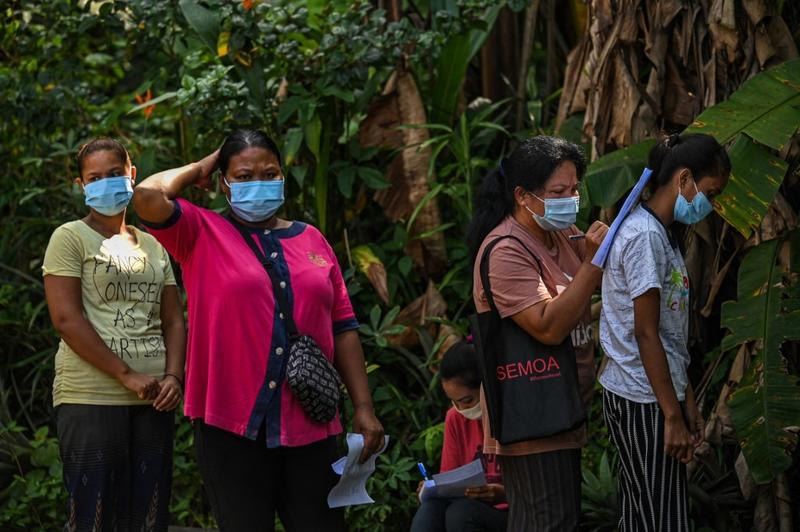 Malaysian indigenous women from the tribe of Temuan wait outside the vaccination centre to be innoculated against Covid-19 coronavirus at their village hall in Sungai Buloh on June 28, 2021. (MOHD RASFAN / AFP)
Malaysian indigenous women from the tribe of Temuan wait outside the vaccination centre to be innoculated against Covid-19 coronavirus at their village hall in Sungai Buloh on June 28, 2021. (MOHD RASFAN / AFP)
SINGAPORE / YANGON / RAMALLAH / KATHMANDU / JERUSALEM / BANGKOK / JAKARTA / SYDNEY / NEW DELHI / ULAN BATOR / BENGALURU / SEOUL / ISLAMABAD / MANILA / TOKYO / PHNOM PENH / BANDAR SERI BEGAWAN / ISTANBUL / KUALA LUMPUR - Malaysia on Thursday announced tighter restrictions on movement and businesses in the capital Kuala Lumpur and neighbouring Selangor state as new coronavirus cases show no sign of abating.
Security Minister Ismail Sabri Yaakob said Kuala Lumpur and several districts in Selangor will see stricter measures imposed from Saturday for a period of two weeks.
Only essential busineses, including factories producing food and daily necessities are allowed to operate, he said in a statement.
Malaysia last week extended a national lockdown to curb the spread of COVID-19. Prime Minister Muhyiddin Yassin said restrictions will not be eased until daily cases fall below 4,000.
The Southeast Asian nation recorded 6,988 new cases on Thursday, bringing the cumulative total to 758,967 infections and 5,254 deaths.
Science minister Khairy Jamaluddin also announced that the country would shorten the dosing interval for the AstraZeneca vaccine to nine weeks from a 12-week gap previously.
Australia
At Bruce Willett's general practice near the locked-down Australian city of Brisbane, the phone is running hot as younger people book AstraZeneca COVID-19 vaccinations after the government suddenly changed policy to free up use of the drug.
Four months into a vaccine rollout sold as the way to reopen the country, the programme in Australia is mired in confusion and frustration after a run of changing medical advice, public political fighting and weak messaging, public health leaders said.
After an aggressive early response spared the country the high death counts seen around the world since early 2020, a patchwork inoculation strategy risks leaving vulnerable groups at risk, while others defy official health advice, casting a fog over re-opening hopes, they added.
The change was a June 28 announcement that the federal government would indemnify physicians against any legal fallout from giving the AstraZeneca jab, once intended as the backbone of Australia's COVID vaccine plan but set to be sidelined amid reports of blood clot links, a rare side-effect.
The move, at the start of a fresh lockdown of most of the country, surprised doctors and ended the policy lockstep between the federal government and its official adviser, the Australian Technical Advisory Group on Immunization (ATAGI), which still recommends AstraZeneca only for over-60s.
For under-40s, though, it presented the first vaccination option since the imported Pfizer alternative was restricted to over-40s due to global supply shortages.
Since then, 2,616 Australians under 40 have booked AstraZeneca shots because "they would rather have the available vaccine than wait", the federal government's vaccine task force chief, Lieutenant General John Frewen, told a morning television show. "All Australians have that right."
ALSO READ: Virus to hit Aussie govt budget, population over next 40 years
Brunei
Brunei reported one new confirmed COVID-19 case on Thursday, bringing the national tally to 261.
According to Brunei's Ministry of Health, Case 261 is a 67-year-old man who arrived in the country from Japan via Singapore on June 18. He does not have any symptom of infection.
Cambodia
Cambodia was speeding up its COVID-19 vaccination drive as new infection rates continued to soar, Prime Minister Samdech Techo Hun Sen said on Thursday.
The Southeast Asian nation confirmed 999 new COVID-19 cases on Thursday, taking the national caseload to 51,384, the health ministry said, adding that 26 more fatalities were reported, bringing the death toll to 628.
In a televised speech on the state-run National Television of Cambodia (TVK), Hun Sen said that 4.2 million people, or 42 percent of the 10-million targeted adult population, have received at least one dose of the COVID-19 vaccine so far.
"We're rushing to inoculate all the 10-million targeted adult population by November ... and then, we will consider providing the vaccine to children aged under 18," he said.
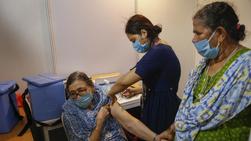 An elderly woman (left) holds the arm of her domestic helper as she receives Covishield vaccine against the coronavirus at a vaccination center in Mumbai, India, on June 22, 2021. (RAFIQ MAQBOOL / AP)
An elderly woman (left) holds the arm of her domestic helper as she receives Covishield vaccine against the coronavirus at a vaccination center in Mumbai, India, on June 22, 2021. (RAFIQ MAQBOOL / AP)
India
Indian drugmaker Zydus Cadila said on Thursday it has applied to the country's drug regulator for emergency use approval of its COVID-19 vaccine, which showed a 66.6 percent efficacy against positive cases in an interim analysis.
The candidate, if approved, would become India's second successful home-grown COVID-19 shot and help ease the country's severe vaccine shortage.
Zydus said the vaccine, which is a three-course regimen, showed safety and efficacy in a late-stage trial with more than 28,000 volunteers across the country, including about 1,000 subjects in the 12-18-year age group.
The drugmaker said it is also evaluating a two-dose regimen for the shot and the immunogenicity results of the shorter course have been found to be comparable with the three-dose regimen.
An approval for the vaccine, ZyCoV-D, would make it the fifth shot authorized for use in India. The country has already approved vaccines from Moderna, AstraZeneca and partner Serum Institute of India, Bharat Biotech, and Russia's Gamaleya Institute.
India's COVID-19 tally rose to 30,411,634 on Thursday, with 48,786 new cases registered during the past 24 hours.
The death toll mounted to 399,459 as 1,005 deaths were recorded since Wednesday morning.
After recording less than 1,000 deaths for three consecutive days, the death toll once again surpassed 1,000 on Thursday.
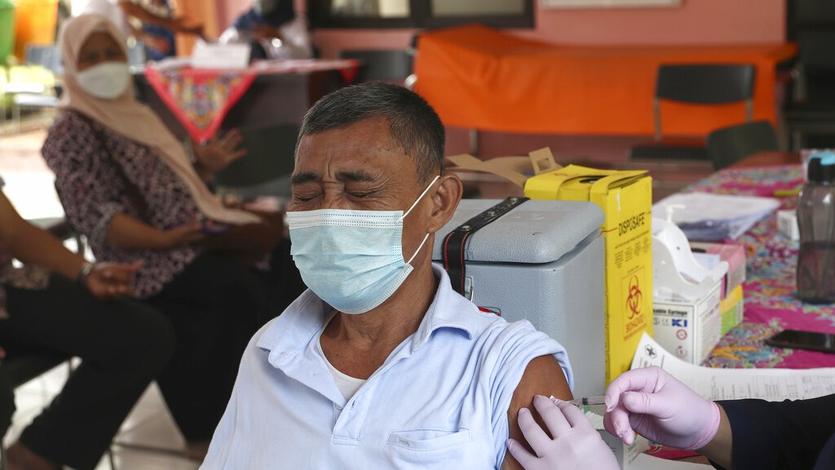 A man receives a shot of the AstraZeneca vaccine during a mass coronavirus vaccination in Jakarta, Indonesia on June 9, 2021. (TATAN SYUFLANA / AP)
A man receives a shot of the AstraZeneca vaccine during a mass coronavirus vaccination in Jakarta, Indonesia on June 9, 2021. (TATAN SYUFLANA / AP)
Indonesia
President Joko Widodo said on Thursday that Indonesia will bring in emergency measures running until July 20 aimed at containing an exponential spike in coronavirus cases that has strained the country's medical system.
There has been a near vertical climb in virus cases in the world's fourth most populous nation in recent weeks, prompting health experts to warn that the outbreak could be as bad as India's devastating second wave if tighter measures are not introduced.
The measures, which will start on Saturday, aim to halve the current number of daily virus cases to below 10,000, and include tighter restrictions on movement and air travel, a ban on restaurant dining and closure of non-essential offices, according to a government document.
They will be applied on the most populous island of Java and on the tourist island of Bali. Further details of the measures will be announced by Indonesia's minister for maritime affairs and investment, Luhut Binsar Pandjaitan, later on Thursday, officials said.
The government also said on Thursday that Indonesia will tighten quarantine and boost testing and vaccinations for COVID-19 and would extend emergency measures if infections do not decline within three weeks.
Authorities were working hard to boost oxygen supplies across Java island and aimed to test half a million people daily, health minister Budi Gunadi Sadikin told a joint news conference.
Indonesia on Thursday reported 24,836 new coronavirus infections and 504 deaths, both record daily highs.
Indonesia’s total cases and deaths are 2,203,108 and 58,995 respectively.
Israel
Israel reported 291 new COVID-19 cases, raising the total infections in the country to 841,777, the country's Ministry of Health said on Wednesday.
The number of active COVID-19 cases in Israel rose to 1,882, the highest since April 22.
The death toll from the virus stood at 6,429, while the number of patients in serious condition increased from 22 to 26.
 People wearing face masks walk through an overpass built to connect train stations in Tokyo on Thursday, July 1, 2021. (HIRO KOMAE / AP)
People wearing face masks walk through an overpass built to connect train stations in Tokyo on Thursday, July 1, 2021. (HIRO KOMAE / AP)
Japan
Japan is likely to extend by two weeks or more coronavirus containment measures in the greater Tokyo area, four government sources said on Thursday, as infection numbers creep up less than a month before the Summer Olympics start.
Japan's capital and three neighbouring prefectures are among areas under a 'quasi' state of emergency set to run through July 11, but a recent uptick in infections has officials leaning towards keeping restrictions in place - a move that could affect the number of spectators allowed into Olympic venues, the sources said.
Depending on the extent of the strain on the medical system, the government could reinstate a full state of emergency for Tokyo, the sources said. New infections in the Olympics' host city rose to 714 on Wednesday, the highest in more than a month.
A decision is expected around July 8, when International Olympic Committee President Thomas Bach is due to arrive in Japan, the sources said.
The Olympics are set to start on July 23 but many in Japan remain opposed to holding the event, which medical experts have warned could unleash another wave of infections.
The 'quasi' state of emergency caps spectators at 5,000. Olympics organisers have said spectators will be allowed up to half of venue capacity or a maximum of 10,000 provided the emergency restrictions are lifted.
Spectators from overseas have already been banned, and some members of the ruling coalition are beginning to favour having no spectators at the Olympics, the sources said.
Mongolia
Mongolia recorded 2,485 new COVID-19 cases in the last 24 hours, bringing the national tally to 117,963, the health ministry said Thursday.
Meanwhile, 15 more fatalities were reported across the country, raising the death toll to 597, it added.
Myanmar
Myanmar reported 1,580 new COVID-19 infections in the past 24 hours, bringing the tally in the country to 157,277 on Wednesday, according to a release from the Health and Sports Ministry.
The death toll increased to 3,334 after 14 more fatalities were reported in the past 24 hours, the release said.
Nepal
The Civil Aviation Authority of Nepal (CAAN) has approved a month-long schedule for Nepali and foreign airlines to conduct international flights from and to 11 foreign destinations, an official said Wednesday.
According to a notice issued in the name of airlines, the CAAN has greenlighted 21 flights per week from and to 11 foreign destinations from July 1 to July 31.
As per the CAAN's notice, the designated airlines can conduct flights from and to New Delhi of India, Doha of Qatar, Istanbul of Turkey, Dubai, Sharjah and Abu Dhabi of the United Arab Emirates, Dammam of Saudi Arabia, Kuwait, Muscat of Oman, Kuala Lumpur of Malaysia and Narita of Japan.
CAAN's spokesman Raj Kumar Chhetri told Xinhua that the flights were approved for a month following consultations with the airlines after the Nepali government decided to increase the number of destinations for the resumption of international flights.
READ MORE: Indonesia to start vaccinating teens to curb virus resurgence
Pakistan
Pakistan confirmed 1,037 new COVID-19 cases, the National Command and Operation Center (NCOC) said on Thursday.
The NCOC, a department leading Pakistan's campaign against the pandemic, said that the country's number of overall cases rose to 958,408, including 904,320 recoveries.
Palestine
Palestine on Wednesday recorded 20 new COVID-19 cases of Delta variant in eight districts in the West Bank.
This raised the total number of the Delta cases recorded in the West Bank to 22 since Sunday, said Minister of Health Mai al-Kaila in a press statement.
Palestine confirmed the first two cases of Delta variant on Sunday, who were two Palestinian girls from the West Bank cities of Qalqilya and Salfit.
"The two infected girls came from the United Arab Emirates through Jordan," al-Kaila said, adding tests have been taken for their close contacts.
Singapore
Singapore is slated to announce a further easing of COVID-19 restrictions in mid-July as part of a strategy for reopening the economy that may also include the long-awaited return of leisure travel by the end of the year, Health Minister Ong Ye Kung told the Straits Times.
With virus clusters in the community coming under control, Ong told the newspaper that the government was looking at raising the number of people allowed to dine together in restaurants from two come July 12, while exploring “other openings” as well.
Singapore's Ministry of Health (MOH) reported 16 new cases of COVID-19 on Wednesday, bringing the total tally to 62,579.
The newly recorded coronavirus infections included five locally transmitted cases who were linked to previously confirmed cases and have already been placed under quarantine.
South Korea
South Korea reported 762 more cases of COVID-19 as of midnight Wednesday compared to 24 hours ago, raising the total number of infections to 157,723.
The daily caseload was down from 794 in the prior day, staying above 700 for two days. The daily average caseload for the past week was 653.
Three more deaths were confirmed, leaving the death toll at 2,021.
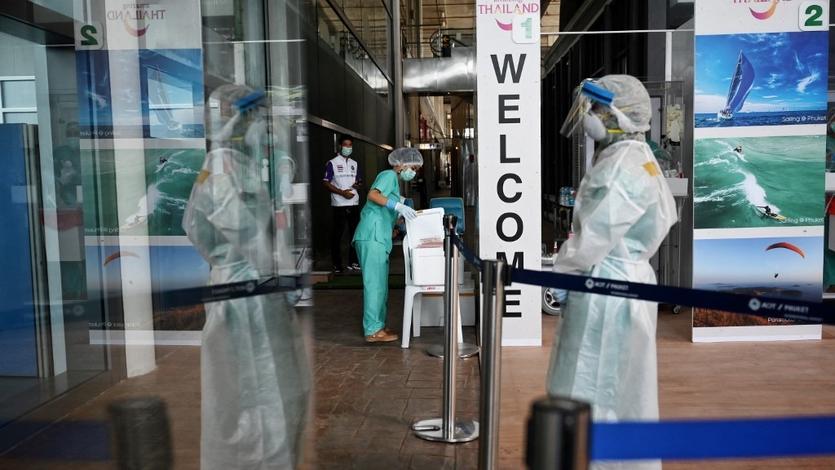 A medical worker prepares coronavirus swab test for international passengers arriving for the “Phuket Sandbox” tourism scheme that allows vaccinated visitors at Phuket International Airport in Phuket on July 1, 2021. (LILLIAN SUWANRUMPHA / AFP)
A medical worker prepares coronavirus swab test for international passengers arriving for the “Phuket Sandbox” tourism scheme that allows vaccinated visitors at Phuket International Airport in Phuket on July 1, 2021. (LILLIAN SUWANRUMPHA / AFP)
Thailand
Vaccinated foreign tourists are due to fly into the Thai resort island of Phuket on Thursday, the first to return to its beaches and golf courses under a pilot programme to revive a tourism industry devastated by the novel coronavirus.
Under the "Phuket sandbox" plan, foreign tourists vaccinated against COVID-19 will not have to spend any time in quarantine and can move around the island freely.
After 14 days, provided three coronavirus tests they must take are negative, they can travel elsewhere in the country.
Prime Minister Prayuth Chan-ocha has flown to Phuket to oversee the reopening, with 249 tourists due to arrive on flights from Israel, Abu Dhabi and Qatar.
While Phuket has seen few COVID-19 cases ahead of its reopening, Thailand on Thursday reported a daily record of 57 deaths from the coronavirus, the second day in a row of record-high fatalities as authorities struggle to control a worrying third wave of infections.
Thailand said on Wednesday it would import nearly four million doses of Moderna's mRNA coronavirus vaccine towards the end of this year and a further one million in early 2022, for use by private hospitals.
The Government Pharmaceutical Organization in a statement said 3.9 million doses of the Moderna vaccine would be delivered in the fourth quarter and 1.1 million doses in the first quarter of 2022.
The Philippines
The Philippines' Department of Health (DOH) reported 5,795 new COVID-19 infections on Thursday, bringing the total number of confirmed cases in the Southeast Asian country to 1,418,337.
The death toll climbed to 24,797 after 135 more patients died from the viral disease, the DOH said.
The number of cases in Metro Manila continued to decline, while infections in the Visayas region in the central Philippines and Mindanao in the south "peaked" in June and showed "signs of decline over the past week," said Alethea De Guzman of the DOH's Epidemiology Bureau said in an online briefing, adding that the national case growth rate and average daily infection rate for the past two weeks have slowed.
Turkey
Turkey on Thursday started to inoculate healthcare workers and people aged 50 and above with the third dose of COVID-19 jabs as part of the ongoing nationwide vaccination campaign.
Health Minister Fahrettin Koca announced the previous day that people who fit this criterion could make appointments for their third vaccination.
"There is no restriction or priority about which vaccine type the third dose would be," Koca said at a televised speech after a Coronavirus Scientific Advisory Committee meeting.
The committee also decided that those who were infected with the coronavirus would be able to take a jab after three months instead of six.
"It was evaluated that this would significantly increase the current antibody level and protection," the minister noted.
Having a population of 83 million, Turkey launched its nationwide rollout in January by inoculating healthcare workers and the elderly with a vaccine developed by China's Sinovac Biotech. It recently included the Pfizer-BioNTech jabs in the program.
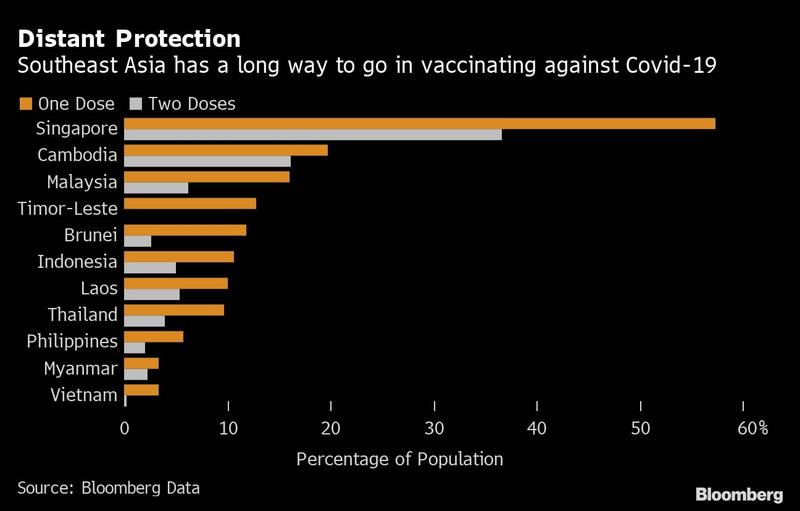 Vaccine misinformation in Asia
Vaccine misinformation in Asia
Millions of people in some of the worst COVID-19 hotspots in Southeast Asia are in no rush for inoculation or just saying no, swayed by disinformation on social media from both local sources as well anti-vaccination movements in the US.
Those false claims are fueling vaccine hesitancy in some pockets of the region, undermining efforts to vaccinate some of the most vulnerable people in Asia and end a pandemic that has stalled the global economy.
In the Philippines, 68 percent of the people are either uncertain or unwilling to take the shots, according to polling company Social Weather Stations.
Anti-vaccination propaganda is a big reason for that hesitancy, which has further slowed takeup in countries already struggling with limited supplies. Less than 10 percent of the population in Thailand and the Philippines have received even one shot.
A heavily Catholic country, the Philippines has been vulnerable to falsehoods peddled online by US evangelical Christian groups, which then filter across through church and family networks.
Despite efforts by governments and companies to curb unsubstantiated information, the false claims in English often continue to spread in non-English speaking communities.
Encrypted platforms, where there’s less moderation, also play a key role, said Ishaana Aiyanna, a researcher at Logically, a technology company that tracks misinformation and targeted disinformation campaigns.
There’s another major reason for hesitancy. With wealthier Western nations getting the lion’s share of the super-effective mRNA shots, poorer countries are having to contend with limited supplies and fewer available brands, exacerbating the problem. When a country offers a choice of only one vaccine, many people want to wait until they can get a higher-efficacy shot.


